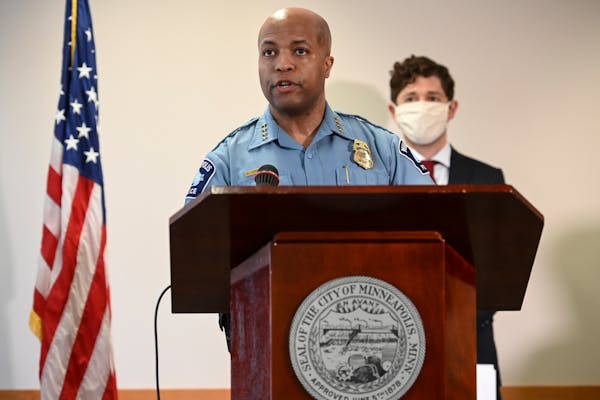The president of the Minneapolis police union said Derek Chauvin's deadly restraint of George Floyd is troubling and substantiates his firing, while he maintained steadfast support for the rank and file.
In his first public comments since Floyd's death on May 25, Lt. Bob Kroll said in a string of media interviews that members of the Minneapolis Police Federation are being unfairly "scapegoated by political leaders in our city and our state, and they have shifted their incompetent leadership, failed leadership onto us and our membership, and it is simply unjust."
However, he acknowledged in an interview aired Tuesday on "CBS This Morning," that Floyd's curbside arrest "does look and sound horrible" on the Facebook video shot by a bystander. It documents the unarmed and handcuffed Floyd repeating "I can't breathe" and begging for his life.
Kroll went further in a follow-up interview with KARE-11, on Tuesday in his criticism of former officer Derek Chauvin, who planted his knee in Floyd's neck, saying the officer's firing was justified because "we've got a pretty good picture of what Chauvin did. It's easy to form judgment there and terminate."
It's a different tone from a letter Kroll wrote to union members days after Floyd's death, in which he expressed support for all four officers involved and said he was working with defense lawyers and labor attorneys to "fight for their jobs. They were terminated without due process."
Kroll was joined by three fellow union leaders for the series of interviews with Twin Cities and national media. They refused to give an interview to the Star Tribune. In a November profile, Kroll said he would no longer talk to the newspaper if it reported his marriage to WCCO-TV reporter and anchor Liz Collin. He said he was concerned it would negatively affect her career.
Video review sought
In the "CBS This Morning" interview, Kroll said the officers' body camera footage could present a fuller picture and that the union has the right to see the still-undisclosed videos.
"It may shed some light that we are unaware of," Kroll said in response to questions from anchor Gayle King. "Right now, we cannot make an informed decision regarding the other officers that do not appear on camera."
In a statement Tuesday afternoon, Mayor Jacob Frey's office said the body camera video from when Floyd was restrained cannot be released in the midst of the ongoing investigation. Exceptions include dispelling "widespread rumor or unrest."
In June 2018, Frey released the body camera video from when police fatally shot Thurman Blevins. The difference, said mayor's spokesman Mychal Vlatkovich, is that there was no witness video to Blevins' encounter with police as there was when Floyd was detained.
Kroll has been the object of repeated protests outside union headquarters, and Police Chief Medaria Arradondo said he has had conversations with him about the Floyd case but declined to say whether he asked Kroll to no longer represent more than 800 Minneapolis and park police.
Kroll said in an interview Tuesday with Minnesota Public Radio that as public pressure mounted, he weighed resigning as head of the union, but board members wanted him to stay for the sake of stability.
'Failed exercise in leadership'
Chauvin is charged with second-degree murder and second-degree manslaughter for pinning his knee into Floyd's neck for nearly eight minutes.
Facing aiding and abetting charges are J. Alexander Kueng and Thomas Lane, who also had their weight on the unarmed and handcuffed Floyd until he become unresponsive and died. A fourth charged officer, Tou Thao, stood by keeping watch over witnesses. All have been fired.
Kroll, a persistent target of criticism, both for his unabashed defense of officers accused of misconduct and because critics believe he represents a bygone era of policing, pushed back during the "CBS This Morning" interview.
"We will be on the right side of history," he said, while acknowledging that what the bystander's video showed happening to Floyd "is horrific."
King questioned Minneapolis Police Federation Vice President Sherral Schmidt, Kroll's designated successor.
"I'm not one that likes to Monday-morning quarterback things," said Schmidt, when asked how the officers on the scene should have handled Floyd. "If I was there, I probably would have put him on his side in a recovery position once he went unconscious."
Another board member, officer Rich Walker, accused news media of feeding the viewpoint that police have it out for black suspects.
"The narrative that is being pushed in the media is that white police officers are out on these streets just to kill black men, and this is absolutely farthest from the truth," said Walker, who is black.
"We are not defending the actions of Mr. Chauvin. What happened to Mr. Floyd is a tragedy. [But] police officers are not out here just randomly hunting black people to kill them. That's just terrible."
Along those same lines, Kroll said that "issues certainly need to be addressed. And we are willing to work through that as we have done in year after year. … There are racial issues. Is it systemic racism? Not in my opinion."
The four officers are having their legal defense paid for the by the Minnesota Police and Peace Officers Association (MPPOA), whose top official pointed out on "CBS This Morning" that the public has yet to hear all the facts about the cases against the men his group is defending.
However, MPPOA Executive Director Brian Peters went on to address Chauvin's actions during Floyd's arrest, saying, "He betrayed the badge. And there's no excuse for it."
Chauvin's attorney, Eric Nelson, declined to respond to Peters' comment.
Paul Walsh • 612-673-4482

Hockey coach with roots in Minneapolis Park and Rec dies at 81

Legal Marijuana Now Party fights to keep its major party status before Minnesota Supreme Court
Officials say man shot 2 months ago in vacant downtown Minneapolis triplex was victim of homicide

Official who helped MSHSL on pioneering ventures dies at 89

